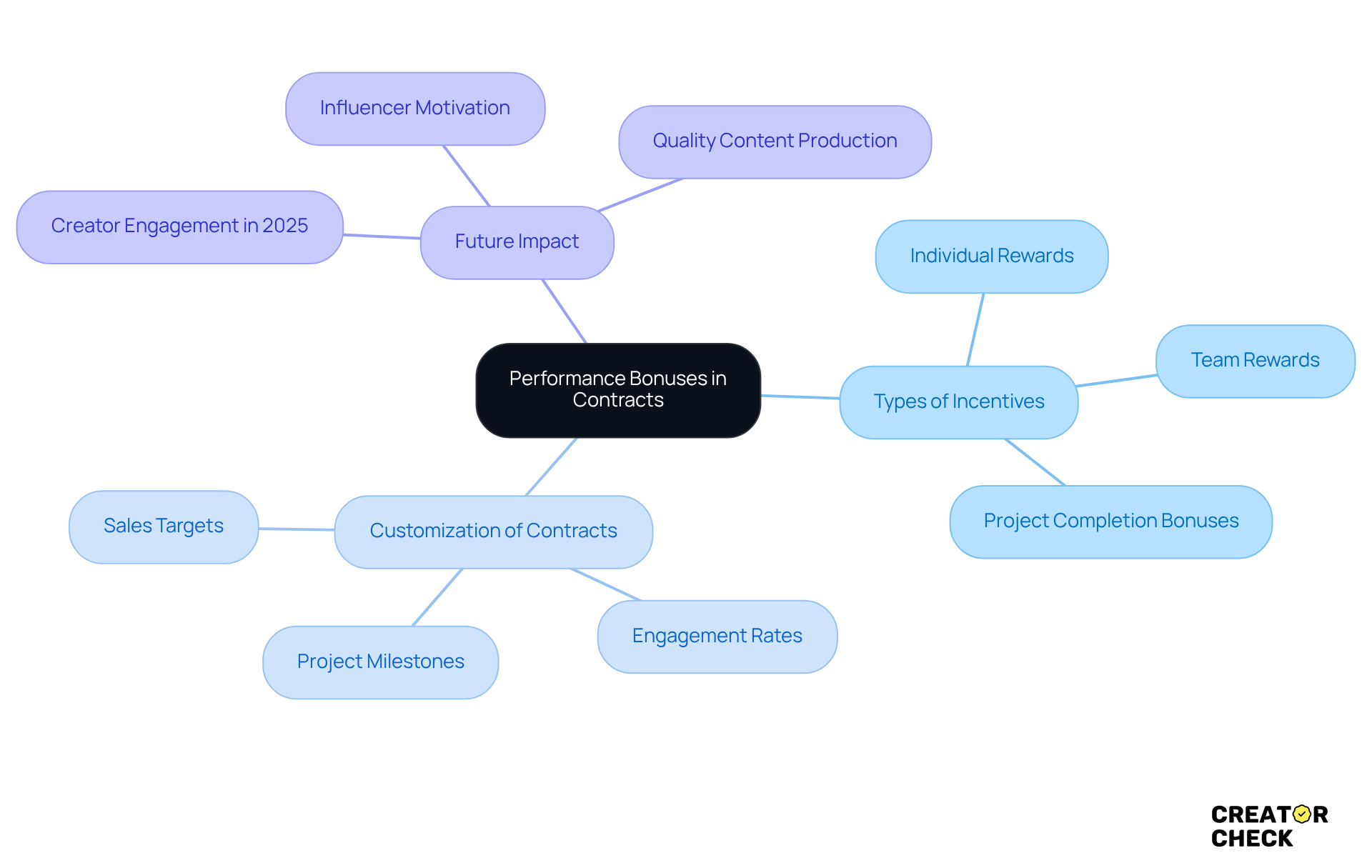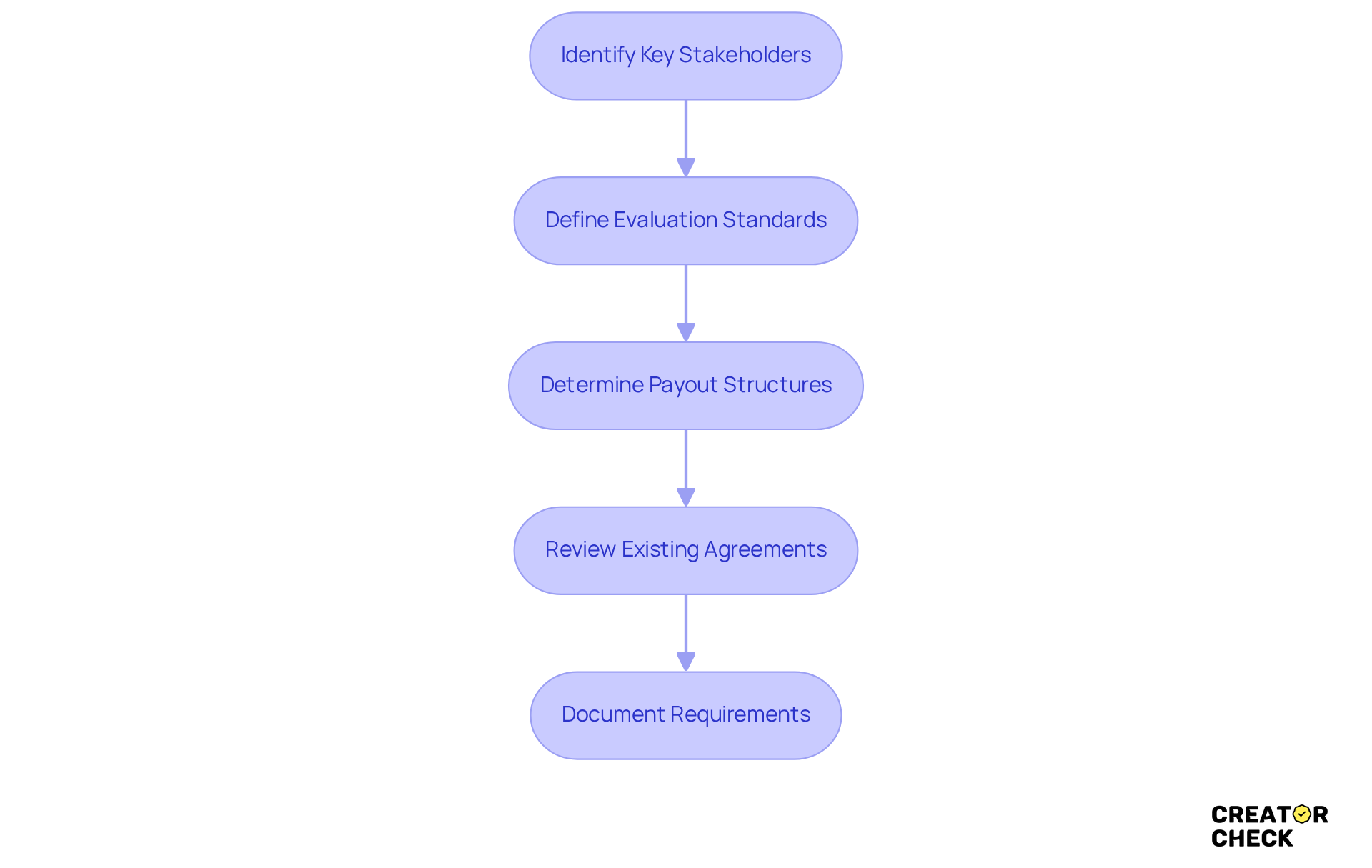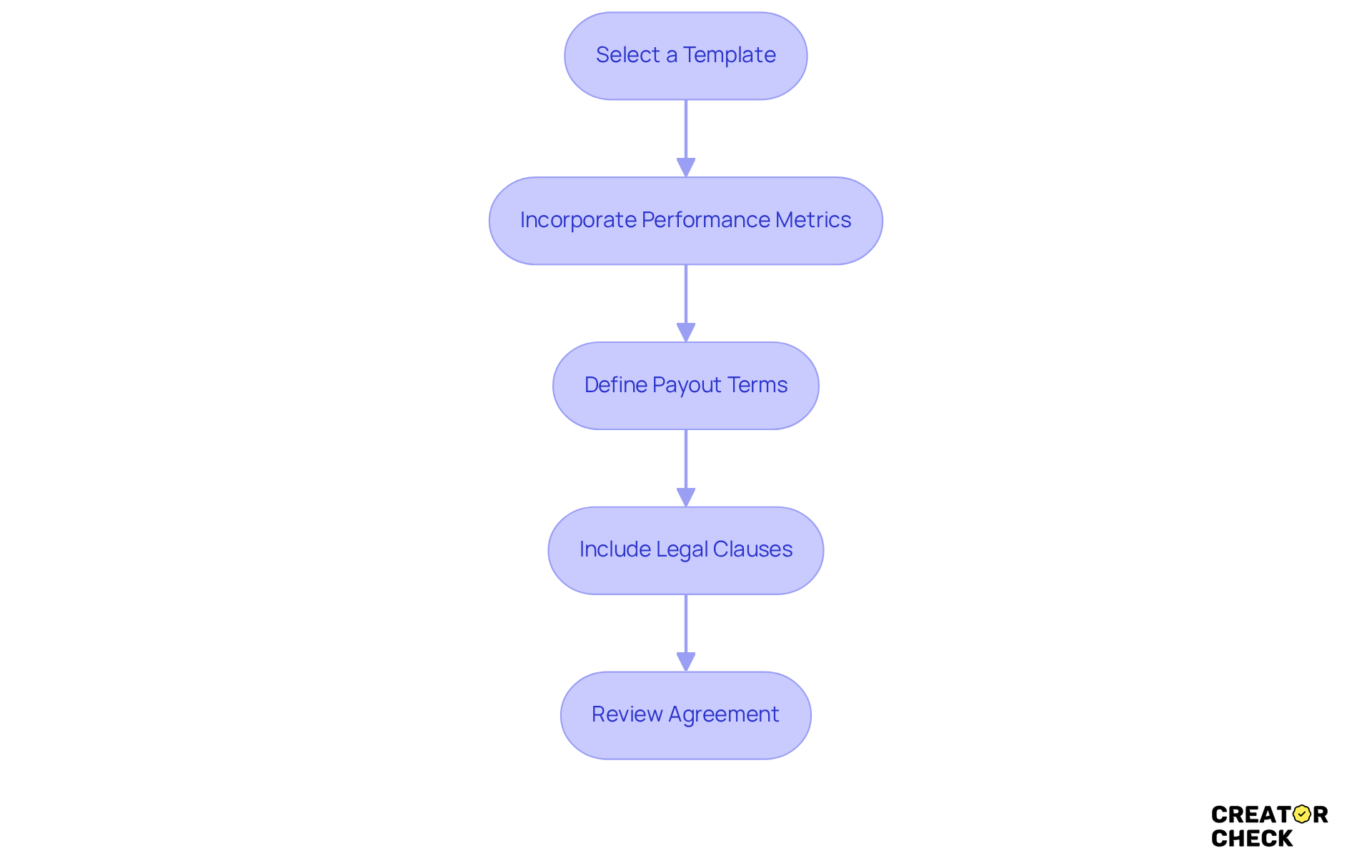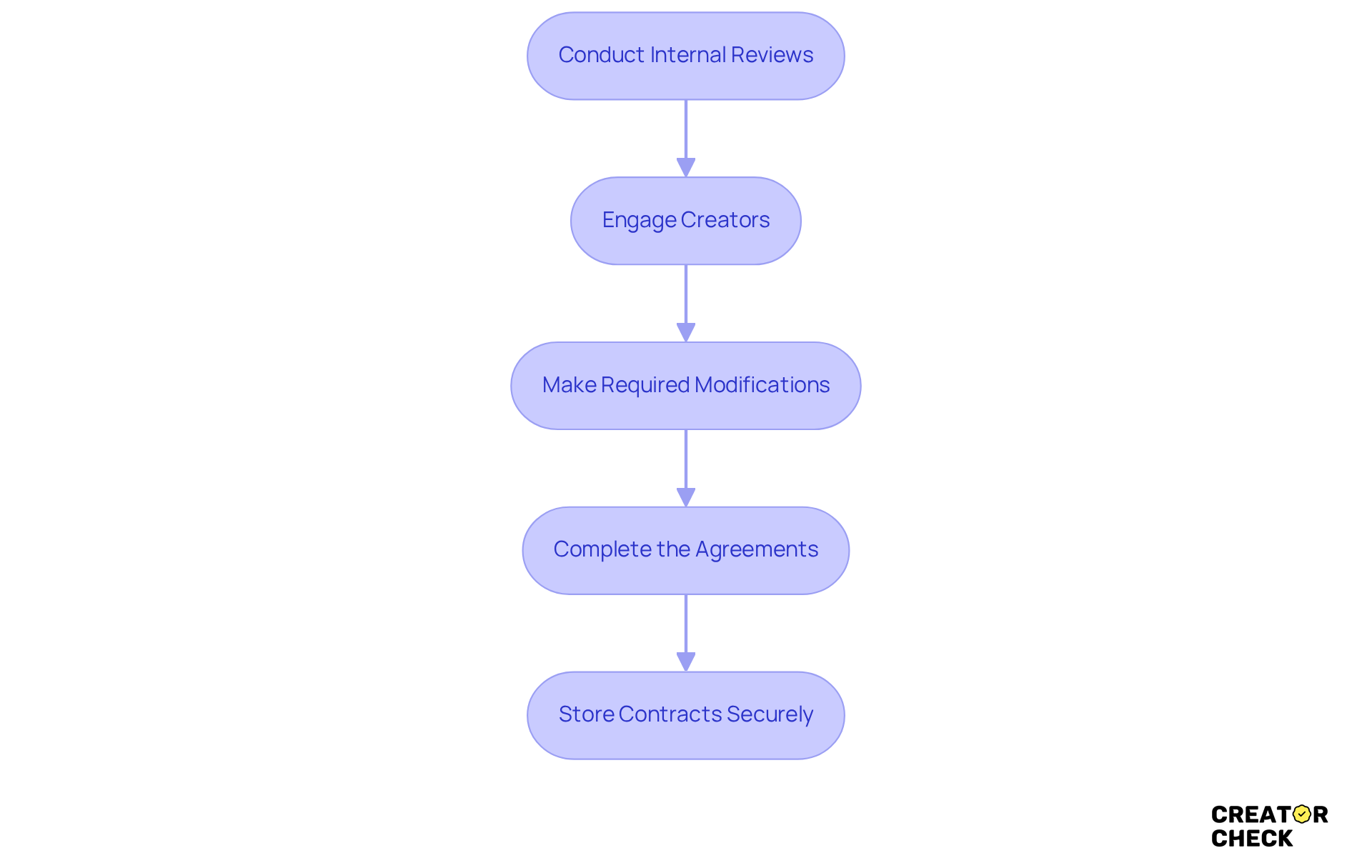Overview
Customizing contract templates for performance bonuses is all about clearly defining those performance metrics, payout structures, and legal clauses that really motivate individuals. It’s essential to align their efforts with your organizational goals.
So, what does this mean for you? Well, this article highlights how important it is to:
- Prepare thoroughly
- Engage stakeholders
- Conduct internal reviews
This way, you can ensure that the contracts meet everyone's expectations, which in turn boosts motivation and performance outcomes. Remember, a well-crafted contract can make a world of difference!
Introduction
Crafting effective performance bonuses within contracts can really boost motivation and productivity for teams and individuals alike. By customizing contract templates, organizations can clearly define success metrics and reward structures, making sure they align with their bigger goals. But amidst the complexities of stakeholder expectations and legal requirements, how can we ensure that these contracts not only incentivize performance but also foster a collaborative spirit?
Let’s dive into the essential steps for tailoring contract templates for performance bonuses, unlocking the potential for greater engagement and success.
Understand Performance Bonuses in Contracts
Incentive rewards are fantastic motivators for individuals, compensating them based on how well they meet or exceed specific success criteria laid out in their agreements. These incentives can come in various forms, like cash bonuses, extra commissions, or other perks tailored to personal or group achievements. It’s important to understand the differences between individual incentives, team rewards, and project completion bonuses, as each type encourages contributors in unique ways. For example, individual rewards celebrate personal successes, while team-based incentives foster collaboration among creators.
To really make performance bonuses work, customizing contract templates for performance bonuses is crucial to clearly define what it takes to earn them. To ensure everyone knows what’s expected, metrics like sales targets, engagement rates, and project milestones should be clear, especially when customizing contract templates for performance bonuses. This transparency not only boosts motivation but also aligns individual efforts with the brand’s goals, ultimately leading to better outcomes.
Looking ahead to 2025, the impact of incentive rewards on creator engagement metrics is clearer than ever. Influencers are more motivated to produce high-quality content when their pay is tied to results. As industry leaders point out, a well-structured incentive system can lead to improved content quality and stronger audience connections, making it a key component of influencer marketing strategies. By setting up effective reward systems, brands can build genuine partnerships with influencers, ensuring both parties benefit from the collaboration.

Gather Requirements for Customization
To effectively engage in customizing contract templates for performance bonuses, start by gathering all the necessary requirements. It’s a good idea to chat with key stakeholders—like agency leaders, creators, and legal advisors—to get a clear picture of their expectations and needs. Here are some steps to guide you:
- Identify Key Stakeholders: Figure out who will be impacted by the contract and bring them into the conversation.
- Define Evaluation Standards: Set up clear and measurable evaluation standards that will trigger the incentives. Think about things like sales figures, engagement rates, or project completion timelines.
- Determine Payout Structures: Decide how bonuses will be calculated and distributed. Will they be a fixed amount, a percentage of revenue, or tiered based on achievement levels?
- Review Existing Agreements: Take a look at past agreements to spot effective components and areas for improvement. This can give you valuable insights into what works and what doesn’t.
- Document Requirements: Put together a comprehensive list of requirements to guide the customization process, making sure all essential elements are captured.
So, what does this mean for you? By following these steps, you can create agreements that involve customizing contract templates for performance bonuses, which not only meet your needs but also motivate your team effectively.

Customize Contract Templates for Performance Bonuses
Once you've gathered all the essential criteria, it's time to start customizing contract templates for performance bonuses in your agreement. Here’s how you can do it:
- Select a Template: Pick a base agreement template that fits your agency's standard agreements. This could be a compensation agreement or a general contract template.
- Incorporate Performance Metrics: Make sure to clearly outline the performance metrics that will determine eligibility for rewards. Use precise language to prevent any confusion, like saying, 'The originator will receive a reward of 10% of total sales for each month that sales exceed $10,000.'
- Define Payout Terms: Specify how and when bonuses will be paid. For instance, you might say, "Bonuses will be paid within 30 days after the end of each quarter, as long as the individual meets the outlined performance metrics."
- Include Legal Clauses: Don’t forget to add all necessary legal clauses, such as confidentiality agreements, dispute resolution processes, and termination conditions. This helps protect both your agency and the creators.
- After you’ve customized everything, take a moment to review the agreement for clarity and conciseness. Make sure all terms are easy to understand to avoid any confusion down the line.
So, what does this mean for you? By following these steps, you’re setting up a solid foundation for rewarding performance through customizing contract templates for performance bonuses, while keeping everything clear and straightforward!

Review and Finalize Customized Contracts
After customizing contract templates for performance bonuses, it’s super important to give everything a thorough review before wrapping things up. So, how do you go about it?
- Conduct Internal Reviews: Start by sharing those tailored agreements with your internal team—think legal advisors and agency leaders. Getting their feedback is key to making sure everything aligns with company policies.
- Engage Creators: Next, bring the tailored agreements to the creators for their take. Encourage them to ask questions and share their thoughts so they can fully grasp the terms.
- Make Required Modifications: Based on the feedback you gather, it’s time to make any necessary tweaks to the agreements. This might mean customizing contract templates for performance bonuses, clarifying some terms, adjusting performance metrics, or even modifying payout structures.
- Complete the Agreements: Once everyone’s on board and happy with the terms, go ahead and finalize those agreements. Don’t forget to collect all the signatures and distribute copies to everyone involved.
- Store Contracts Securely: Finally, make sure to store the finalized contracts in a safe spot—like a contract management system—so you can easily access them and stay compliant with legal requirements.
Remember, a little preparation goes a long way in ensuring smooth sailing ahead!

Conclusion
Customizing contract templates for performance bonuses is a smart move that can really boost motivation and productivity among your teams and individuals. By tailoring these agreements to clearly define expectations and rewards, organizations can create an atmosphere where contributions are recognized and rewarded based on measurable outcomes.
Throughout this article, we've shared some key insights on:
- Understanding performance bonuses
- Gathering requirements for customization
- The steps needed to craft effective contract templates
By emphasizing stakeholder involvement, clear performance metrics, and thorough reviews, you can ensure that the final agreements are not just legally sound but also in line with everyone's goals. This structured approach can lead to better engagement and collaboration, ultimately driving improved results.
So, what does this mean for you? The effective customization of contract templates for performance bonuses isn’t just a procedural task; it’s a vital practice that can strengthen partnerships and elevate overall performance. We encourage you to take these insights to heart and implement them to foster a more rewarding and motivating work environment. By doing so, you can tap into the full potential of your teams and achieve greater success together.
Frequently Asked Questions
What are performance bonuses in contracts?
Performance bonuses are incentive rewards that motivate individuals by compensating them based on how well they meet or exceed specific success criteria outlined in their agreements.
What forms can performance bonuses take?
Performance bonuses can come in various forms, including cash bonuses, extra commissions, or other perks tailored to personal or group achievements.
What is the difference between individual incentives and team rewards?
Individual incentives celebrate personal successes, while team rewards foster collaboration among group members.
Why is customizing contract templates for performance bonuses important?
Customizing contract templates is crucial to clearly define the criteria for earning performance bonuses, ensuring everyone understands what is expected.
What metrics should be included in performance bonuses?
Metrics like sales targets, engagement rates, and project milestones should be clearly defined to boost motivation and align individual efforts with brand goals.
How do performance bonuses impact creator engagement metrics?
Performance bonuses motivate influencers to produce high-quality content when their pay is tied to results, leading to improved content quality and stronger audience connections.
What role do performance bonuses play in influencer marketing strategies?
A well-structured incentive system can enhance influencer marketing strategies by building genuine partnerships between brands and influencers, ensuring mutual benefits from collaboration.




